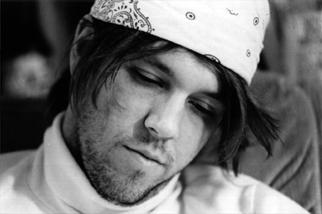Inspiration, Jest, Love: Missing David Foster Wallace

Meanwhile, let another Rolling Stone reporter take your attention, for a different if no less compelling reason: a meditation on a writer we miss, David Foster Wallace. In the latest New York Review of Books, Wyatt Mason considers David Lipsky’s book on Wallace, and—as Lipsky knew, and so chose to wrote his book this way, and as his publishers knew, and so chose to give it to us like this—the best things here are Wallace’s own words. His suicide was not the end anyone wants for someone so young with so much left to give.
Lipsky had early, affirmed genius, too; see here for a description of how Raymond Carver recognized his talent. He teaches at N.Y.U. and spent ample time with Wallace preparing what never became an RS profile. AlthoughOf Course You End Up Becoming Yourself is a Wallace-esque title, and is (creatively?) composed of transcripts: these authors’ conversations. Wallace could talk. And, as his fans know, he could write. His instinct to always tell more, to always let us inside and underneath an idea once expressed, became the celebrated principle of his style. You might call it unedited. (Mason takes compelling issue with this.) You might call it brilliant. But you would not mistake it for being restrained, and we forgave Wallace his lack of restraint as what he did was so compelling. More footnotes, and more footnotes of footnotes, and then further footnotes of those footnotes: this was a style in parody of an ambitious—and somehow distinctly young—academic, even as Wallace seemed like someone who might not like the more traditional confines of academic life.
The bandanna was a sign, too. This was someone who, in one heartbreaking piece that appeared in The New Yorker attests, cared deeply about his work, someone who consciously wrestled with demons and who was for all appearances at the peak of production in his life when he ended it. Lipsky’s book might fill the need we always feel after an unjust loss: that the possibility of an answer exists. Somewhere in here there might be an explanation of what went wrong, of what was missing.
Mason’s piece illuminates one aspect of Wallace’s mission: to give a gift to readers by breaking stylistic boundaries. Mason ends with this note, followed by (in italics) one of the most heartbreaking and exquisite paragraphs a Wallace short story:
“Although it has been said, in the wake of Wallace’s suicide in 2008, that it would be wrong to read his body of work through the limiting prism of his death, it would be no less wrong were we to evade acknowledging the centrality of depression, addiction, and isolation as subjects in his work, not to say how bravely he sought forms that could contain them. As Wallace has his fictional version of Lady Bird Johnson tell one of the President’s aides in the great story “Lyndon”:
[Lyndon’s] hatred of being alone is a consequence of what his memoir will call his great intellectual concept: the distance at which we see each other, arrange each other, love. That love, he will say, is a federal highway, lines putting communities, that move and exist at great distance, in touch. My husband has stated publicly that America, too, his own America, that he loves enough to conceal deaths for, is to be understood in terms of distance.”
Love: in the end, Wallace knew much is reducible to a quest for it, an understanding of it, and a fierce battle against its absence.





